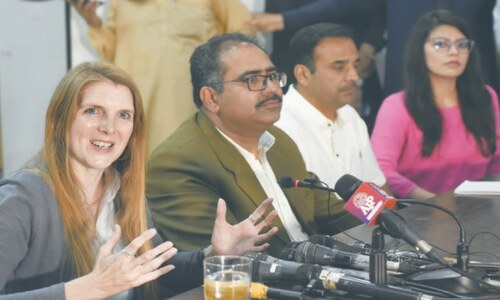ISLAMABAD: An agreement was signed between the Italian Agency for Development Cooperation, the United Nations Development Porgramme and EvK2CNR on Wednesday to preserve the mountain ecosystem and improve the quality of life in the northern areas.
Under the memorandum of understanding, the three parties agreed to work on a project titled ‘Improvement of the Central Karakoram National Park (CKNP) Management System as a Model for Mountain Ecosystems in Northern Pakistan’. The project will also cover the second highest plateau in the world, the Deosai National Park.
The programme supports conservation by bringing in the use of scientific technology to eliminate and promote biodiversity and support education and the protection of cultural heritage.
A media presentation depicted the Italian presence in the Karakoram Range since the early 1900s in order to illustrate the historical relationship between Italy and Pakistan, and included photos from Filippo de Filippos’ 1909 expedition, Count Ardito Desio’s expedition in 1954 and Vittono Sella’s expedition in 2004.
Agreement signed to preserve mountain ecosystem, improve quality of life in northern areas
Climate Change Minister Zahid Hamid, who attended the signing ceremony, said the CKNP, which is located in Skardu and spread across 10,000 square kilometres, is the largest protected area.
With the five tallest peaks in the world and home to some of the largest glaciers, the CKNP is rich in biodiversity and provides a habitat to globally significant species such as the snow leopard and the markhor, he said.
“As can be expected, this pristine location is facing environment challenges that require careful consideration. Pollution around Concordia and melting glaciers threaten the mountain ecosystem and the life and communities that it supports,” Mr Hamid said.
Gilgit-Baltistan Minister for Planning Iqbal Hassan called for assistance to protect the CKNP’s natural environments, particularly in the wake of rising tourism in the last three years.
“We more than welcome our guests, but the conservation of natural resources is needed now more than ever,” he said.
UNDP country director Ignacio Artaza lamented how natural resources are being exhausted, which could leave future generations in trouble.
“It is important that we consume natural resources such as land and water and other resources carefully. Utilizing these resources effectively is necessary for sustainable development,” he said.
Speakers also announced the launch of the winter expedition on K2, the second highest peak in the world.
According to Rahmatullah Baig, who was part of a successful Pakistani-Italian group expedition on K2 in 2014, told the briefing that this winter in 2018, another joint expedition on K2 will try to attempt to summit the peak for the first time in winter.
“K2 is the only mountain out of the 14 highest peaks in the world above 8,000 metres that has never been summitted in the winter season. Together, we will attempt to change that and make history,” Mr Baig said.
Published in Dawn, March 30th, 2017














































Dear visitor, the comments section is undergoing an overhaul and will return soon.